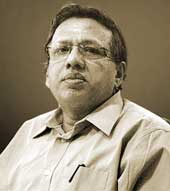 |
Some 23 years ago, during an ordinary day of routine work as assistant passport officer in a sarkari office in Cochin, P. Luiz John hit upon an idea that was rather extraordinary, to say the least. It was risky, and he knew it. But he also knew that it was the key to a life that he always desired but never got. And time was on his side — John was only 29 then.
Today, as proprietor of Eloor Libraries, John — who never went back to pushing files since he quit his job in 1983 — is the proud owner of six lending libraries, the latest opening in the plush quarters of South Extension in Delhi only a couple of months ago. He boasts of more than 40,000 people on his membership list. They regularly drop into his libraries — each a treasure trove for the discerning bibliophile — to pick up one or more of the 300,000-plus books that he currently has on his catalogue.
Success hasn’t come easy, and he’s now savouring every bit of it. “It began as my desire to be master of my own destiny,” says John, sitting in the back-office of the spacious basement library, where knowledge is stacked along every inch of the sleek woodwork that adorns the room. The idea of starting a lending library, he says, was there at the back of his head; he had used them extensively during his college days in Cochin. “Lending libraries were dying out, so I thought it might be a good idea to revive the tradition.”
He began by borrowing money from a doting uncle in 1979, with which he rented space along the Cochin Marine Drive and piled in about 2,000 books. “The first few years were dismal,” he recalls — so dismal that he often dropped in at the library on his way back from office only to hear that not a single person had come in. “Such days were not rare,” he smiles. “I had to just hang on and hope for things to change, even as my operational costs were shooting up.”
It took about three years for the tide to turn. “I started breaking even from the fourth year. That’s when I quit my job to take up the library business full time,” he says.
There were technical problems, though. John was no management graduate, and he didn’t have a clue about library sciences. He had to go by his instincts. “I learnt a few things from other libraries,” he says. For example, he decided to keep the reading fee of a book to 10 per cent of its cost price. As for reading period, he decided to extend it to two weeks instead of the one-week period that he had initially decided on. “The only kind of promotion I got in the beginning was by word of mouth,” he recalls. “Then, some newspapers wrote articles on the library. That’s how we came to be noticed.”
By 1986, the Cochin library had given John enough confidence to start a second shop in Trivandrum. In successive years, he opened lending libraries in Bangalore, Chennai and Calcutta, before setting his sights on Delhi.
The principle on which John runs his libraries is simple. A person can become a member of a library by paying a one-time refundable security deposit; the amount varies from city to city. Following the payment, readers can borrow books up to one-and-a-half times the value of the deposit by paying 10 per cent of the book’s price. “It takes at least eight readings for us to recover the price of a book, after which we register profits,” says John. “And we have no other form of revenue generation apart from reading fees.”
But given the fact that it rakes in enough money for John to run all his six libraries with flair, one can only attribute his venture to innovative thinking. And it’s something John does all the time. “I have been toying with the idea of starting home delivery of books,” he says. “With all the traffic bottlenecks around town, it often becomes impossible for readers to come to the library regularly.” Recently, John has also set up his own website, www.eloorlibraries.in, where one can log on to access information about the libraries.
Clearly, the man seems to be devoted to his duty of ensuring that none of his clients go without their daily read. Some might say his is a story of a reader leading other readers — and they wouldn’t be wrong.
Based on a conversation with Anirban Das Mahapatra in New Delhi










